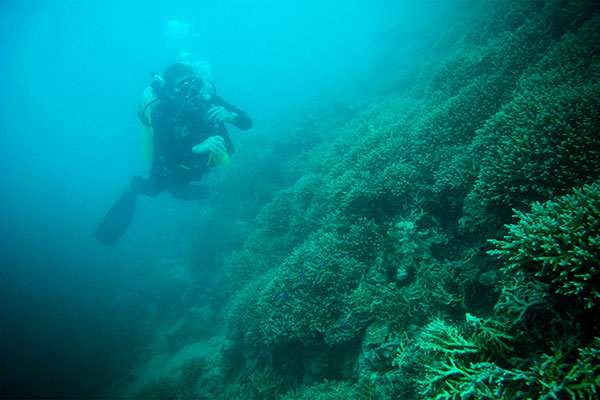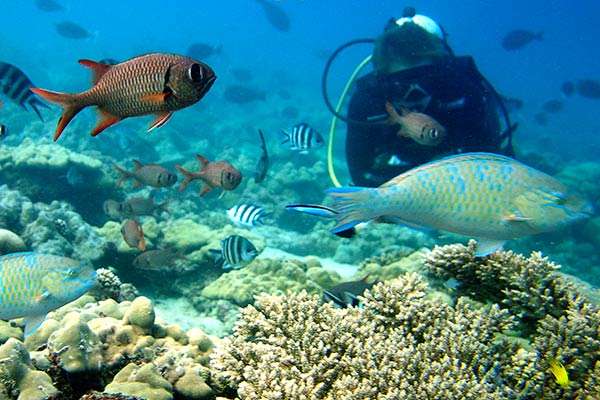Researchers urge protection for reefs in turbid environments

When you think about coral, invariably your first thoughts are of pristine waters and a colourful reef, buzzing with marine activity. But did you know there is coral right here in Sydney Harbour? And in fact, these corals could hold valuable information about the future of our reefs under the spectre of climate change.
"We're not sure if they've been here for several hundred thousand years and cut off from coral communities further north by currents or if these are the offspring of corals from the Great Barrier Reef who have only arrived relatively recently," says Associate Professor in UTS's Plant Functional Biology and Climate Change Cluster (C3) David Suggett.
"If they've evolved a specific physiology to live in extreme environments, like Sydney Harbour, then they may die off because they're adapted to cooler waters. But if they're originating from the Great Barrier Reef, that indicates those corals have highly flexible physiology and may become far more abundant as water temperatures rise."
Currently, we don't know which is the case because so little is known about how, or if, corals can adapt to extreme environments. That's the question underpinning Suggett's current research (and will be the focus of a UTSpeaks public lecture he's headlining on August 13, Coral at the Edge). His work will, for the first time, establish a baseline of coral biodiversity at its southernmost limit, here in the harbour, and compare the physiology of the local coral community to corals further north.
Suggett's interest in coral in non-traditional conditions came about during a 2010 trip to the Seychelles, off the east coast of Africa, when he was called upon to conduct an environmental impact assessment on a proposed hotel site.
"Everyone had assumed it was a degraded ecosystem, but once we went a few metres below the surface we found this really beautiful reef. And what it suggested to us was that it had been buffered, or was a refuge against climatic impacts in the past, that had decimated other corals in the area.

"In the past these more turbid environments have been perceived to have low conservation value – we'd rather preserve the blue water sites like the Great Barrier Reef. But the turbid environments hold a store of genetic material that could be really important in terms of future change," says Suggett.
"We don't understand how corals can live in these environments but it's critical that we find the answer." The reason is corals, and in particular coral reefs, play a critical role in the marine ecosystem.
"Everything on a coral reef is either dependent on the physical structure corals make with their calcium carbonate skeleton – these beautiful architectures with lots of little places for fish and critters to live in – or it acting as a food source for things that feed on its living tissues."
However, increased atmospheric carbon dioxide levels pose two huge threats to reefs worldwide.
"Firstly, the atmosphere traps more heat, so the waters warm. Secondly, oceans love to suck up carbon dioxide but as they do, they become more acidic – water plus carbon dioxide makes carbonic acid," explains Suggett.
"Over geological history, there's been enough neutralising power of seawater that we haven't seen bubbling acidic oceans, but we're currently putting so much carbon dioxide into the atmosphere so quickly that we're exceeding the capacity of seawater to neutralise it."
Importantly, corals in turbid environments seem to already have learned to cope with such extreme environmental conditions, making Sydney Harbour an excellent site for this research.
"You might argue you want to protect the most resilient species because they're the strongest and most plastic – we should protect those ones because that's the future. The counter argument is they're the most resilient and don't need as much protection so we should focus on the weedy ones.
"Right now, we're not really sure which species are the weak or the strong. Our research will fill that gap so we can help governments decide on the best management strategy."
Provided by University of Technology, Sydney



















